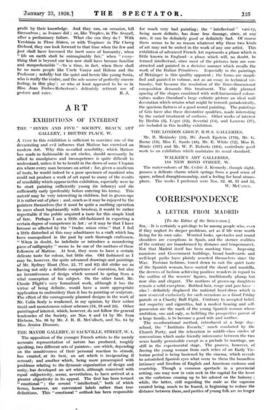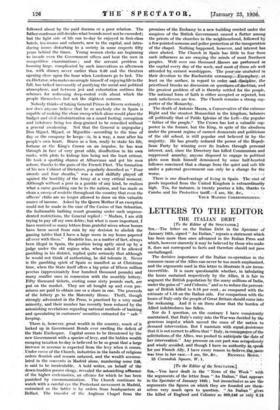CORRESPONDENCE
A LETTER FROM MADRID
[To the Editor of the SPECTATOR.] SIR,—It is certainly a privilege to be among people who, even if they neglect its deeper problems, act as if life were worth living for its own sake. Worried looks, spectacles and round shoulders arc exceptions in Spain, and the sterner realities of the century are transformed by distance and temperament. Not that Madrid itself has been marking time. Imposing mansions and Government buildings, broad boulevards and well-kept parks have plainly asserted themselves since the War. Parisian fashions, toned down to suit the quiet taste of the Spanish woman, have ousted the shawl and mantilla, the decrees of fashion achieving positive wonders in regard to the outline of the wearers' figures, traditionally plump but now slim and elegant. The mothers of grown-up daughters remain a solid exception. Bobbed hair, rouge and jazz have— alas !-definitely displaced the national head-dress which is now reserved exclusively for such occasions as a Good Friday parade or a Charity Bull Fight. Contrary to accepted belief, not coquetry and cigarettes, but a modest bearing and self- possession are the mark of the young Spanish woman whose ambition, one and °lily, as befitting the prospective parent of a large family, is to become a good wife and mother.
_ The co-educational method, introduced at a large day- school, the " Instituto Escuela," much combated by the Church Party, and the relaxation in middle-class circles of conventions which make friendly intercourse between the two sexes hardly permissible except as a prelude to marriage, are still in the experimental stage. The process, however, of freeing the young woman from such relics of an Early Vic- torian period is being hastened by the cinema, which reveals to astonished Spanish eyes what seem to them the boundless intimacy and freedom of English and American customs and courtship. Though a common spectacle in a provincial setting, one may now in vain seek in the capital for the lover on the curbstone craning up to his adored on the balcony ; while, the latter, still regarding the male as the supreme created being, much to be feared, is beginning to reduce the distance between them, and parties of young folk are no longer followed about by the paid duenna or -a poor relation. The father-confessor still decides what bounds must not be exceeded ; but the light side of life can to-day be enjoyed in first-class hotels, tea-rooms and cabarets, new to the capital, and intro- ducing issues disturbing to a society in some respects fifty years behind the times. Young women clerks are beginning to invade even the Government offices and beat the men in competitive examinations ; and the servant problem is looming large, complicated by such innovations as afternoon tea, with dinner,-never earlier than 9.30 and the theatres opening close upon the hour when- Londoners go to bed. The ex-Dictator, who makes no scruple himself of enjoying life to the full, has talked incessantly of purifying the social and political atmosphere, and between jest and exhortation outlines fine schemes for redressing deep-rooted evils about which the people themselves feel not the slightest concern.
Nobody thinks of taking General Primo de Rivera seriously ; nor does anyone believe that he or anybody else in Spain is capable of making the'elian-Sweep tail& alone would place the Midget and Civil administration on a sound footing, corruption and indolenee being too deep4rained to be remedied without a gerieral awakening. ' NOt that the General is unpopular DOn Miguel, 1.1figuel; Or MigUelito-Laccording to the time of day or the company -he keeps—ii; in a way, a man after his people's ()an heart. Brave as a lion, ready -to' stake his life; fortune or the King's Crown on an impulse, he has iiion through in face of very great odds, disaffection in his own rankS, with plots to kidnap him being not the keit Serious. He took a sporting chance at Alhiicemas and got his men ashore, thanks to the grins of the French Fleet. The formation of his new Cabinet of Dictators, popularly- described as " Four siverds and fOUr sheaths," was a card skilfully played off against the hostility of the Army at a very critical moment. Although' without a peer in a gamble of any kirid, he realizeS what a curse gambling can be to the nation, and has made so clean a sweep of roulette throughout the country that even the officers' clubs' are no longer allowed to draw on this valuable source of income. Asked by the Queen Mother if an exception Could not be made in the case of the Casino of San Sebastian, the fashionable bathing resort groaning tinder such unprece- dented restrictions, the General -replied : " Madani, I am still trying to pay off my own debts ; but what is more important, I have received so many letters from grateful wives whose homes have been saved from ruin by my decision to abolish the gaming tables that I have a large room in my house papered all over with them." Roulette has, as a matter of fact, always been illegal in Spain, the position being aptly sized up by a judge under the old regime who, when asked if he allowed gambling in his district, replied quite seriously that although he would not think of authorizing, he did tolerate it. Never is the gambling spirit of Spain so manifest as at Christmas time, when the State itself offers a big prize of fifteen million pesetas (approximately four hundred thousand pounds) and many smaller ones in connexion with the monthly lottery. Fifty thousand tickets, costing some sixty pounds each, are put on the market. They are all bought up and even pre- miums are paid to obtain one or a share in one. The proceeds of the lottery go to the Maternity Home. Thrift, though strongly advocated in the Press, is practised by a very small minority, and their number has recently been reduced by the astonishing revelations regarding national methods of banking and speculating in customers' securities entrusted for " safe " keeping.
. There is, however, great wealth in the country, much of it locked up in Governinent Bonds ever swelling the deficit of the State Exchequer. Capital seems to be threatened by the new Government with a species of levy, and the hidden wealth escaping taxation to-day is believed to be so great that a large increase in revenue is expected from the levy When it comes. . Under cover of the Church, industries in the hands of religious orders flourish and remain untaxed, and the wealth accumu- lated in the convents in Madrid alone, numbering some 248, is said to be incalculable. A bold writer, on behalf of the down-trodden poorer clergy, revealed the astonishing affluence Of the higher ecclesiastics, an offence for which he has been punished by excommunication. The Church continues to Watch with a careful eye the Protestant movement in Madrid, restrained as the latter is by orders from headquarters at Belfast. The transfer of the Anglican Chapel from the premises of the Embassy to a new -building erected under the auspices of - the- British Government caused a flutter among the priests of the -churches in the neighbourhood, followed by a few pointed sermons and police protection at the inauguration of the chapel. Nothing happened, however, and interest has since abated. The Church in Spain has little to fear from such influences as are swaying the minds of most Nerthern peoples. Well over one - thousand Masses are performed in the capital every day of the week,•and most uf them aibe well attended -by.„-earnest -worshippers: The poor:are unabated in their devotion- to the Eucharistic ceremony; s.-EXemplary,- at least on the surface, in- regard to order awl: diseipl€ne, -the priesthood- brooks no discussion, on questionsoof,doctrint; and the greatest problem of all is thereby settled for the people; The national form of faith is either accepted or rejeeted, but rank unbelievers are few. The Church remains a strong sup- porter of the Monarchy. _ The death-of Antonio Maura, a Conservative of the extreme Right and the- stoutest Monarchist in the kingdom, balances off politically that of Pablo Iglesias of ,the Left-the popular " father of the people." The-Crown -has lost a valuable sup- porter in the former,• but the- King, in spite -of the aloofness under the present regime of earnest democrats and politicians of the old school, is Mill = popular and. believed- in by--the majority. He has greatly reduced the -power of the Repuh7 limn- Party by winning over its leaders through personal interest, and, since the Directory has killed Communism- and suppressed anarchy, anyone disposed to engage in political plots soon finds himself denounced by some half-hearted follower convinced that a change from the quiet and safe life under a- paternal government can only be a change for the worse.
There is one disadvantage of living in -Spain. The- cost of goods imported from the United Kingdom is extraordinarily high. -Tea, -for instance, is twenty pesetas- a- kilo, thanks to Cambo and his Protective tariff.—I am, Sir; &c.,
YOUR MADRID CORRESPONDENT.











































 Previous page
Previous page